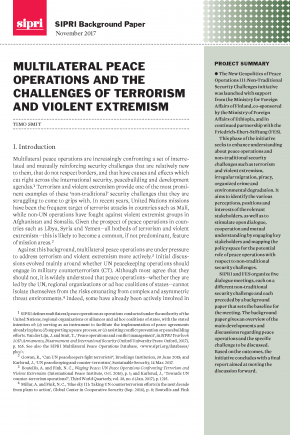Multilateral Peace Operations and the Challenges of Terrorism and Violent Extremism
Multilateral peace operations are increasingly confronting a set of interrelated and mutually reinforcing security challenges that are relatively new to them, that do not respect borders, and that have causes and effects which cut right across the international security, peacebuilding and development agendas. As a result, the New Geopolitics of Peace Operations III: Non‑Traditional Security Challenges initiative seeks to enhance understanding about peace operations and non-traditional security challenges such as terrorism and violent extremism, irregular migration, piracy, organized crime and environmental degradation. As apart of this initiative, this SIPRI Background Paper explores the ‘non-traditional’ security challenges that terrorism and violent extremism present to multilateral peace operations.
In recent years, United Nations missions have been the frequent target of terrorist attacks in countries such as Mali, while non-UN operations have fought against violent extremist groups in Afghanistan and Somalia. Given the prospect of peace operations in countries considered hotbeds of terrorism and violent extremism, this is likely to become a common, if not predominant, feature of mission areas. Thus, multilateral peace operations are under pressure to address terrorism and violent extremism more actively. Against this backdrop, this SIPRI Background Paper explores the terrorism and violent extremism-related challenges that multilateral peace operations face in their efforts to create and implement effective missions.
The New Geopolitics of Peace Operations III: Non‑Traditional Security Challenges initiative was launched with support from the Ministry for Foreign Affairs of Finland, co-sponsored by the Ministry of Foreign Affairs of Ethiopia, and in continued partnership with the Friedrich-Ebert-Stiftung (FES).
I. Introduction
II. Peace operations and CT and P/CVE
III. Examples of peace operations that have engaged in CT and P/CVE
IV. Peace operations, CT and P/CVE: Potential implications
V. Cooperation and coordination
VI. Conclusions

